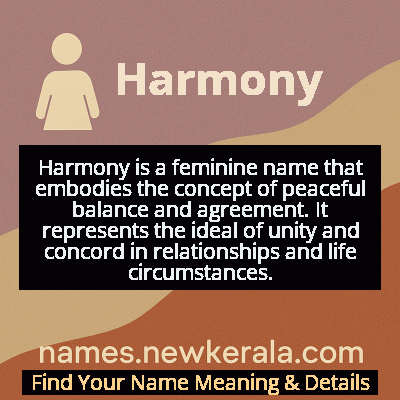Harmony Name Meaning & Details
Origin, Popularity, Numerology Analysis & Name Meaning of Harmony
Discover the origin, meaning, and cultural significance of the name HARMONY. Delve into its historical roots and explore the lasting impact it has had on communities and traditions.
Name
Harmony
Gender
Female
Origin
Unknown
Lucky Number
4
Meaning of the Name - Harmony
Harmony is a feminine name that embodies the concept of peaceful balance and agreement. It represents the ideal of unity and concord in relationships and life circumstances.
Harmony - Complete Numerology Analysis
Your Numerology Number
Based on Pythagorean Numerology System
Ruling Planet
Uranus (Rahu)
Positive Nature
Strong sense of order, loyal, practical, and disciplined.
Negative Traits
Stubborn, overly serious, rigid, and prone to feeling restricted.
Lucky Colours
Blue, gray.
Lucky Days
Saturday.
Lucky Stones
Blue sapphire.
Harmony Numbers
1, 7, 8.
Best Suited Professions
Managers, engineers, accountants, organizers.
What People Like About You
Dependability, discipline, practicality.
Famous People Named Harmony
Harmony Korine
Filmmaker and Artist
Directed influential films like 'Kids' and 'Spring Breakers', known for avant-garde approach to cinema
Harmony Santana
Actress
First openly transgender actress nominated for an Independent Spirit Award for her role in 'Gun Hill Road'
Harmony Rose
Adult Film Actress
Won multiple AVN Awards and became one of the most recognized performers in her industry
Harmony Zhu
Pianist
Child prodigy pianist who performed at Carnegie Hall at age 6 and has appeared on major television programs
Name Variations & International Equivalents
Click on blue names to explore their detailed meanings. Gray names with will be available soon.
Cultural & Historical Significance
Extended Personality Analysis
Individuals named Harmony typically exhibit personality traits centered around balance, diplomacy, and emotional intelligence. They often possess a natural ability to mediate conflicts and create peaceful environments, acting as calming influences in stressful situations. Their empathetic nature allows them to understand multiple perspectives, making them excellent listeners and advisors who can bridge differences between people. Harmonys tend to be creative souls with an appreciation for aesthetics, whether in music, art, or interpersonal relationships. They value cooperation over competition and often excel in collaborative settings where their talent for bringing people together shines. While generally peaceful, they can be surprisingly assertive when defending their principles of fairness and justice. Their emotional depth combines with practical wisdom, creating individuals who are both dreamers and problem-solvers. This balance between idealism and pragmatism makes them effective in both personal relationships and professional settings where harmony and teamwork are valued.
Modern Usage & Popularity
In modern times, Harmony has seen a significant rise in popularity as a given name, particularly in English-speaking countries since the 1970s. The name peaked in the United States around 2010-2015, ranking within the top 200 female names, reflecting broader cultural trends toward virtue names and nature-inspired appellations. Contemporary usage often reflects parents' aspirations for their children to embody peaceful qualities and balanced personalities. The name appeals to diverse demographics, from spiritually-minded families to those simply appreciating its melodic quality. While its popularity has slightly declined in recent years, it maintains steady usage and continues to be chosen by parents seeking names with positive connotations and modern yet timeless appeal. The name's versatility allows it to work well in both formal and casual contexts, contributing to its enduring appeal across different social and cultural backgrounds.
Symbolic & Spiritual Meanings
Symbolically, Harmony represents the fundamental human aspiration for balance, unity, and peaceful coexistence. It embodies the concept that disparate elements can come together to create something greater than their individual parts—whether in music, relationships, or society. The name symbolizes the resolution of conflict through understanding and the beautiful complexity that emerges when different voices, perspectives, or elements work in concert. In a metaphorical sense, Harmony represents the golden mean between extremes, the sweet spot where tension and release create beauty and meaning. It speaks to the interconnectedness of all things and the universal human desire for order amidst chaos. The name carries connotations of musical perfection, emotional equilibrium, and social cohesion, making it a powerful symbolic representation of ideal human relationships and the quest for meaning through balance and unity.

